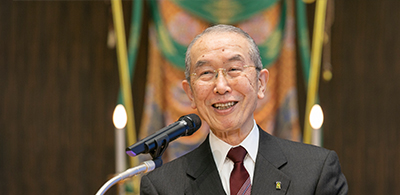The Mind of Compassion—Forbearance, Part 2
June 2022

The Highest Form of Forbearance
“When you question / Whether someone is good or bad, / You are questioning yourself, / For that person becomes / Your mirror,” is a poem by Zen master Ryokan (1758–1831). It gives us an impression similar to the proverb, “The fault of another is a good teacher,” which means that by looking at people’s words and actions, you are reflecting on your own behavior. However, this poem seems to have an additional, deeper meaning.
In this poem, Ryokan is telling himself, “If complaints or compliments reach your ears, do not get angry or let them go to your head, just take a good long look at yourself.” After all, when someone evaluates you in that way, isn’t there something about you that makes them have such thoughts?
This poem teaches us that such self-reflection is a practice of forbearance that naturally calms any disturbance in our minds. Also, although many people, from children to adults, were fond of Ryokan, it seems that some people were not amused by that.
One day, a monk who had always been jealous of Ryokan came, drunk and covered in dirt, to call on the Zen master. Suddenly, he started beating Ryokan with his own sash. Ryokan, however, just let the monk beat him and in the evening, after the trouble had passed, saw that a steady rain was falling and murmured, “Did that monk have rain gear?”
In last month’s issue, I mentioned that forbearance is the feeling of being able to naturally accept events and people, rather than just enduring or putting up with them. Of course, we should accept and acknowledge them but, in addition, as this anecdote shows us, compassion also gives us great strength and support in practicing forbearance.
Founder Niwano said, “When people hear the teachings, gradually deepen their sense of the oneness of self and others, and form the habit of looking at things objectively, they acquire a spirit of tolerance and are able to understand other people’s positions. As a result, their minds no longer give rise to feelings of anger, hatred, and resentment. Instead, they are compassionate, feel bad for those people, and wish to help them free themselves from their mistaken ideas” (Shinshaku hokke sanbu kyo [The Threefold Lotus Sutra: A Modern Commentary], Vol 1). This spiritual state is called “the highest form of forbearance.”
Turning Our Minds a Little toward the Teaching
We may only realize what is important in life through an event that brings suffering and sadness. Ryokan also wrote the maxim, “Forbearance is the source of merits.” I think that “merits” here indicate those things that, little by little, we come to understand and realize through painful, sad experiences. These are the merits that come from looking firmly at things that are difficult to accept and acknowledging them, so that your mental capacity gradually expands and you become able to accept things more flexibly. Also, I think that for those of us with strong egos, hardship can provide a great opportunity to realize the limitations of our thinking and to start a new life in our present lifetimes; this, too, is one of the great merits of forbearance.
That said, we aren’t giving up on being able to practice forbearance with a calm mind like the Buddha’s, are we?
Looking at Ryokan’s legacy, I feel that by simply doing such things as freeing ourselves from the past, enthusiastically taking on even one pastime, listening sincerely to people’s advice, and accepting that “it’s all up to me” when we reflect upon ourselves, we are turning our minds, even a little, toward the Buddha’s teachings in that moment and in that situation, and are thereby able to master for ourselves the mind of flexibility and forbearance—what the Lotus Sutra describes as “the robe of the Tathagata.” Speaking of the importance of the compassion that supports forbearance, from the perspective of the unity of oneself and others, we should always remember to interact with people sincerely. We do so because we inherently possess the buddha nature.
In closing, I would like to quote another one of Ryokan’s poems. “At my inn, / A spider’s thread is attached to some plants. / I was about to brush it away, / But I quickly stopped myself.” With the mind of unity between ourselves and others, we pray for the well-being of even those we dislike or hate. I believe that those prayers bring with them peace.




